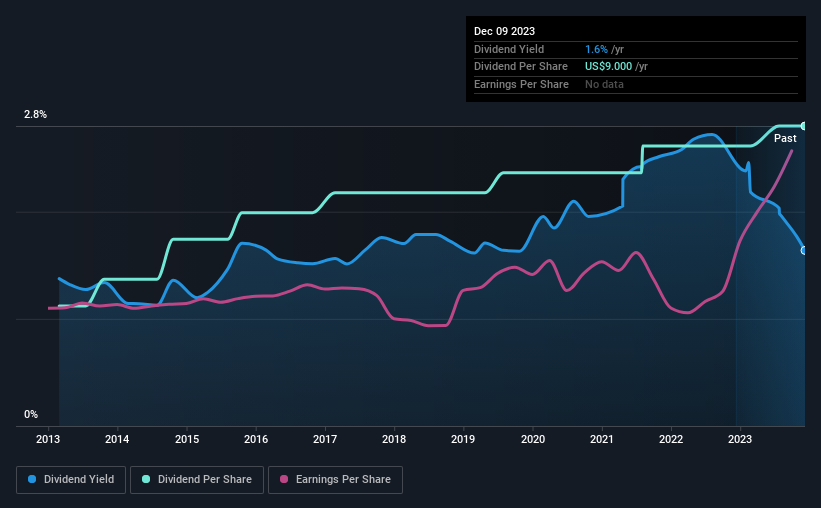Why You Might Be Interested In NewMarket Corporation (NYSE:NEU) For Its Upcoming Dividend
NewMarket Corporation (NYSE:NEU) stock is about to trade ex-dividend in four days. The ex-dividend date is one business day before the record date, which is the cut-off date for shareholders to be present on the company's books to be eligible for a dividend payment. It is important to be aware of the ex-dividend date because any trade on the stock needs to have been settled on or before the record date. Meaning, you will need to purchase NewMarket's shares before the 14th of December to receive the dividend, which will be paid on the 2nd of January.
The company's next dividend payment will be US$2.25 per share. Last year, in total, the company distributed US$9.00 to shareholders. Based on the last year's worth of payments, NewMarket has a trailing yield of 1.6% on the current stock price of $549.18. Dividends are an important source of income to many shareholders, but the health of the business is crucial to maintaining those dividends. We need to see whether the dividend is covered by earnings and if it's growing.
View our latest analysis for NewMarket
Dividends are typically paid from company earnings. If a company pays more in dividends than it earned in profit, then the dividend could be unsustainable. NewMarket has a low and conservative payout ratio of just 21% of its income after tax. A useful secondary check can be to evaluate whether NewMarket generated enough free cash flow to afford its dividend. Luckily it paid out just 19% of its free cash flow last year.
It's positive to see that NewMarket's dividend is covered by both profits and cash flow, since this is generally a sign that the dividend is sustainable, and a lower payout ratio usually suggests a greater margin of safety before the dividend gets cut.
Click here to see how much of its profit NewMarket paid out over the last 12 months.
Have Earnings And Dividends Been Growing?
Businesses with strong growth prospects usually make the best dividend payers, because it's easier to grow dividends when earnings per share are improving. Investors love dividends, so if earnings fall and the dividend is reduced, expect a stock to be sold off heavily at the same time. That's why it's comforting to see NewMarket's earnings have been skyrocketing, up 21% per annum for the past five years. NewMarket looks like a real growth company, with earnings per share growing at a cracking pace and the company reinvesting most of its profits in the business.
Another key way to measure a company's dividend prospects is by measuring its historical rate of dividend growth. Since the start of our data, 10 years ago, NewMarket has lifted its dividend by approximately 9.6% a year on average. It's encouraging to see the company lifting dividends while earnings are growing, suggesting at least some corporate interest in rewarding shareholders.
The Bottom Line
Should investors buy NewMarket for the upcoming dividend? We love that NewMarket is growing earnings per share while simultaneously paying out a low percentage of both its earnings and cash flow. These characteristics suggest the company is reinvesting in growing its business, while the conservative payout ratio also implies a reduced risk of the dividend being cut in the future. It's a promising combination that should mark this company worthy of closer attention.
While it's tempting to invest in NewMarket for the dividends alone, you should always be mindful of the risks involved. Case in point: We've spotted 1 warning sign for NewMarket you should be aware of.
A common investing mistake is buying the first interesting stock you see. Here you can find a full list of high-yield dividend stocks.
Have feedback on this article? Concerned about the content? Get in touch with us directly. Alternatively, email editorial-team (at) simplywallst.com.
This article by Simply Wall St is general in nature. We provide commentary based on historical data and analyst forecasts only using an unbiased methodology and our articles are not intended to be financial advice. It does not constitute a recommendation to buy or sell any stock, and does not take account of your objectives, or your financial situation. We aim to bring you long-term focused analysis driven by fundamental data. Note that our analysis may not factor in the latest price-sensitive company announcements or qualitative material. Simply Wall St has no position in any stocks mentioned.

